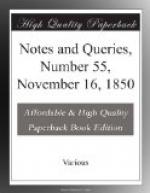I don’t know that I can add anything to Mr. SPEDDING’S able analysis of Henry VIII. There are certain tricks of expression he, no doubt, has observed that characterise Fletcher’s style, and which abound in the play. It might be useful to make notes of these; and, at some future time, I may send you a selection. I now beg to send you the following extracts, made some time ago, showing the doubts entertained by previous writers on the subject:—
“Though it is very difficult to decide whether short pieces be genuine or spurious, yet I cannot restrain myself from expressing my suspicion that neither the prologue nor epilogue to this play is the work of Shakspeare. It appears to me very likely that they were supplied by the friendship or officiousness of Jonson, whose manner they will be perhaps found exactly to resemble.”—Johnson.
“Play revived in 1613.”
“Prologue and epilogue added by Jonson or some
other person.”—Malone.
“I entirely agree with Dr. Johnson, that Ben Jonson wrote the prologue and epilogue to this play. Shakspeare had a little before assisted him in his Sejanus.... I think I now and then perceive his hand in the dialogue.”—Farmer.
“That Jonson was the author of the prologue and epilogue to this play has been controverted by Mr. Gifford. That they were not the composition of Shakspeare himself is, I think, clear from internal evidence.”—Boswell.
“I entirely agree with Dr. Johnson with respect to the time when these additional lines were inserted.... I suspect they were added in 1613, after Shakspeare had quitted the stage, by that hand which tampered with the other parts of the play so much as to have rendered the versification of it of a different colour from all the other plays of Shakspeare.”—Malone.
“If the reviver of this play (or tamperer with it, as he is called by Mr. Malone) had so much influence over its numbers as to have entirely changed their texture, he must be supposed to have new-woven the substance of the whole piece; a fact almost incredible.”—Steevens.
The double character of Wolsey drawn by Queen Katherine and her attendant, is a piece of vigorous writing of which any other author but Shakspeare might have been proud; and the celebrated farewell of the Cardinal, with his exhortation to Cromwell, only wants that quickening, that vital something which the poet could have breathed into it, to be truly and almost incomparably great.
“Our own conviction
is that Shakspeare wrote a portion only of this
play.
“It cannot for a moment be supposed that any alteration of Shakspeare’s text would be necessary, or would be allowed; as little is it to be supposed that Shakspeare would commence a play in his old-accustomed, various, and unequalled verse, and finish it in the easy, but somewhat lax and familiar, though not inharmonious numbers of a reverent disciple.”—Tyas’s Shakspeare, vol. iii. p. 441.
At the same time I made the following notes from Coleridge:—




